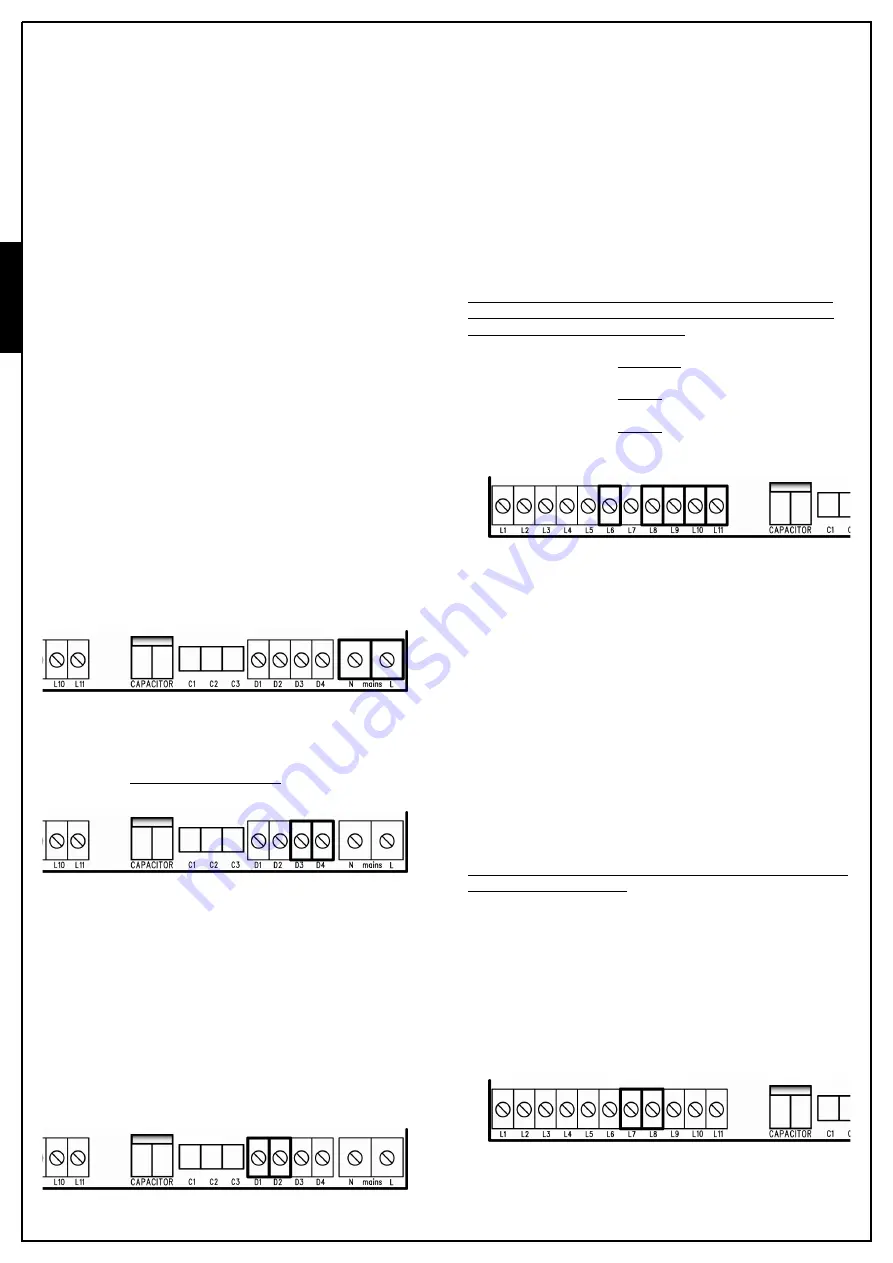
E
N
G
L
IS
H
DESCRIPTION OF THE CONTROL
UNIT
The PRGS2 control unit is an innovative V2 product guaranteeing
safety and reliability for sliding gate automation.
• 230V - 50Hz or 120V - 60Hz power supplies, depending on
the model, for 1 x 700 W max. single phase motor.
• Input for keyswitch or push-button.
• Input for safety photocell.
• Input for safety edge, capable of handling standard edges
with switch normally closed and conductive rubber edges with
nominal resistance of 8.2 kOhms.
• Inputs for open and close limit switches.
• Pre-opening safety device testing.
• Dip-switch programmable operational logic.
• Adjustment of motor power and operation time by means of
a trimmer.
• Quick plug-in connector for inserting a
Mr1
series receiver.
• LED monitoring of inputs.
• Courtesy light output.
INSTALLATION
Installation of the control unit, the safety devices and accessories
must be performed with the power supply disconnected.
POWER SUPPLY
The control unit must be powered by means of a 230 V - 50 Hz
or 120 V - 60 Hz power line, depending on the model, protected
by a differential magnetothermal switch in compliance with legal
regulations.
Connect the power cables to the control unit
L
and
N
terminals.
BLINKER
The control unit provides for the use of a 230 V - 40 W or 120 V
- 40 W blinker with built-in intermittence.
Connect the cables to terminals
D3
and
D4
.
COURTESY LIGHT
This output has a normally-open clean contact relay which closes
for approx. 1 second at the start of an opening phase. This
switch may be used to activate a courtesy light timer (max. load:
230V - 4A).
PLEASE NOTE:
If there is no timer, the courtesy light can be
controlled using channel 4 of receiver MR1: bistable or timer
programmable channel (read the instructions for the receiver MR1
thoroughly).
The switch is on terminals
D1
and
D2
.
PHOTOCELLS
The control unit has a 24VAC power supply for photocells with
switch normally closed, and can perform an operational test
before starting the gate opening procedure.
The photocell can be used with two settings:
1. Photocell always active:
Intervention of the photocell during opening or closing
causes the gate to stop.
When the photocell restores, the gate re-opens completely.
2. Photocell NOT active during opening:
Intervention of the photocell during opening is ignored.
Intervention of the photocell during closing causes the gate
to re-open completely.
Independently of the setting selected, when the gate is paused
while opening, the time count for any automatic re-closure will
only start after the photocell restores.
• Connect the photocell transmitter power cables between
terminals
L10
(GND) and
L11
(+) on the control unit.
• Connect the photocell receiver power cables between
terminals
L10
(GND) and
L9
(+) on the control unit.
• Connect the photocell receiver output between terminals
L6
and
L8
on the control unit.
SAFETY EDGES
The control unit has an input for controlling safety edges; this
input is capable of controlling standard edges with switch
normally closed, optical edges and conductive rubber edges with
nominal resistance of 8.2 kOhms.
Edges can be used with two settings:
1. Edge always active:
Intervention of the edge during opening or closing causes
inversion of the direction of movement in order to free the
body that caused the edge to intervene.
The gate stops after approx. 3 seconds.
2. Edge NOT active during opening:
Intervention of the edge during opening is ignored.
Intervention of the edge during closing causes the gate
re-open completely.
Independently of the settings selected, any subsequent automatic
re-closure will be cancelled.
Standard edge with switch normally closed:
connect the
edge cables between terminals
L7
and
L8
on the control unit.
In order to satisfy the requirements of standard EN12978, it is
necessary to install safety edges with a control unit which
constantly monitors correct operation. If control units are used
with the option of running tests by means of interrupting the
power supply, connect the control unit power supply cables
between terminals
L10
(GND) and
L11
(+).
-26-
Summary of Contents for NewROTOR
Page 2: ......
Page 4: ......
Page 55: ......
Page 58: ...L1 P1...
Page 80: ......
Page 82: ...Fig 1 Fig 2 Fig 3...
Page 83: ...Fig 4 SYNCHRO...
Page 84: ...Fig 5 NO SYNCHRO...













































